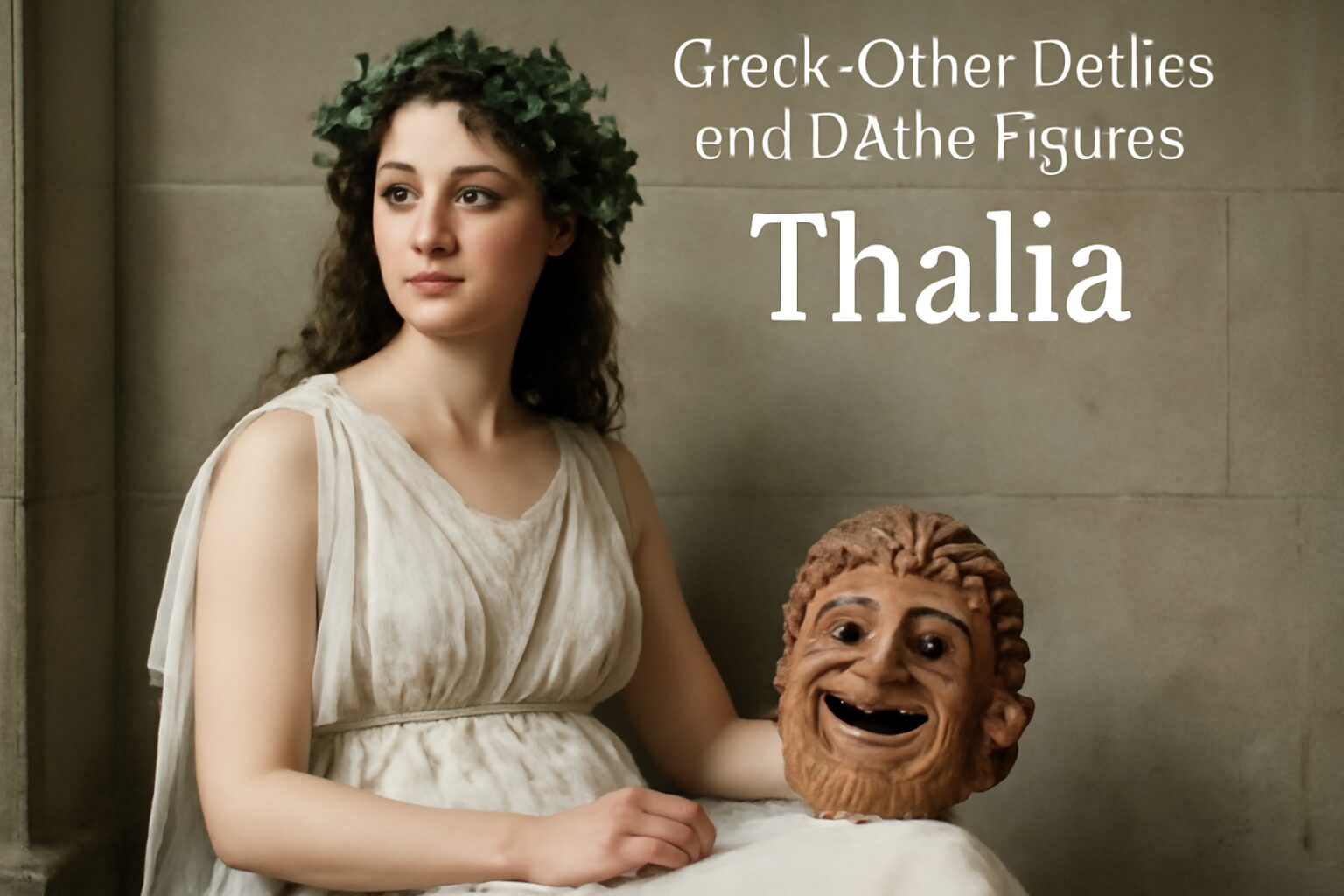Thalia: The Muse of Comedy and Idyllic Poetry
In Greek mythology, Thalia (Θαλία, meaning "the joyous" or "the flourishing") was one of the nine Muses, the divine daughters of Zeus and Mnemosyne (Memory). As the Muse of comedy and pastoral poetry, she brought laughter, lightheartedness, and the beauty of rural life to the arts.
Role and Symbolism
Thalia presided over comic theater and light verse, often depicted holding a comic mask or a shepherd's crook, symbolizing her dual domains. Unlike her sister Melpomene, the Muse of tragedy, Thalia represented the lighter side of storytelling—where humor and happy endings prevailed. She was also associated with bucolic poetry, celebrating nature, shepherds, and rustic life.
Appearance and Depictions
Artists often portrayed Thalia as a youthful, cheerful figure crowned with ivy (a plant sacred to Dionysus, god of theater) and wearing a simple, flowing robe. Sometimes, she was shown with a trumpet or a tambourine, emphasizing her connection to festivity and performance.
Relationships and Myths
Though Thalia rarely starred in myths herself, she was part of the Muses' collective influence on artists and poets. In one lesser-known tale, she was pursued by Apollo, god of the arts, who admired her creative spirit. Some accounts also link her to Dionysus, reinforcing her ties to revelry and theatrical comedy.
Legacy and Influence
Thalia's name lives on in modern language—thaleia in Greek means "rich festivity," and the term Thalia Theater is still used for comedy venues today. Alongside her sisters, she embodied the Greek ideal that art should elevate the human spirit, whether through laughter or the serenity of pastoral verse.
Alternative Names for Thalia
God Name: Thalia (Roman)
In Roman mythology, Thalia retains her Greek name as she was directly adopted from Greek mythology without a name change. She is one of the nine Muses, specifically the Muse of comedy and idyllic poetry.
God Name: u0398u03acu03bbu03b5u03b9u03b1 (Greek)
This is the original Greek name of Thalia, written in the Greek alphabet. u0398u03acu03bbu03b5u03b9u03b1 (Thaleia) means 'the joyous, the flourishing,' reflecting her association with festivity and rich banquets.
God Name: Charis (Greek (Epithet))
Thalia is sometimes referred to as one of the Charites (Graces), where she embodies festivity and celebrations. This name highlights her role in bringing joy and abundance.
God Name: Muse Thalia (Greek (Epithet))
This name emphasizes her role as one of the nine Muses, specifically the Muse of comedy and pastoral poetry, distinguishing her from other figures named Thalia in mythology.
Tales about Thalia
The Gift of Laughter: Thalia and Dionysus
In the heart of a sun-drenched vineyard, Dionysus, the god of wine and revelry, noticed that the mortals celebrating his festivals had grown weary. Their dances lacked joy, and their songs felt hollow. Determined to restore merriment, he sought out Thalia, the Muse of comedy and idyllic poetry, whose very presence could coax laughter from stones.
Thalia, crowned with ivy and holding her iconic comic mask, joined Dionysus under a canopy of grapevines. She whispered tales of whimsical mishaps and playful satyrs, her words weaving spells of humor. Dionysus, inspired, poured ambrosia-laced wine into the cups of the revelers. As Thalia’s stories unfolded, the air filled with genuine laughter, and the festivals erupted with renewed vitality. From that day, their partnership symbolized the union of art and ecstasy, reminding all that joy is a divine craft.
The Blossom of Peace: Thalia and Eirene
During an era of strife among the city-states, Eirene, the personification of peace, descended to the mortal realm, her olive branch trembling in the turbulent winds. She found the people too burdened by conflict to embrace her gifts. Desperate, she journeyed to Helicon, the home of the Muses, and knelt before Thalia.
Thalia, touched by Eirene’s plight, took her hand and led her to a grove where she performed a comedy about foolish kings and reconciled rivals. The audience, once divided, now shared smiles and tears of relief. As laughter melted animosity, Eirene’s olive branch bloomed with golden light, spreading calm across the land. Together, they proved that peace could be nurtured not only by treaties but by the unifying power of mirth.
Frequently Asked Questions
Who is Thalia in Greek mythology?
Thalia is one of the nine Muses in Greek mythology, specifically the Muse of comedy and idyllic poetry. She is often depicted holding a comic mask, a shepherd's crook, or a wreath of ivy.
Why is Thalia important among the Muses?
Thalia represents the lighter side of creativity, focusing on comedy and joyful poetry. Her role highlights the importance of humor and lightheartedness in art and storytelling, balancing the more serious themes represented by other Muses.
What can we learn from Thalia's symbolism?
Thalia's association with comedy teaches us the value of laughter and joy in human life. Her presence reminds us that art and creativity aren't just about serious themes, but also about entertainment and happiness.
How is Thalia different from other Muses?
While many Muses represent serious arts like history (Clio) or epic poetry (Calliope), Thalia specifically governs comedy and light poetry. This makes her unique in focusing on entertainment and humor rather than solemn subjects.
Are there modern references to Thalia today?
Yes, Thalia's influence continues in modern terms like 'thalian' (relating to comedy) and in various cultural references to the Muses. Many theaters and comedy groups use her name or imagery to represent the comedic arts.













